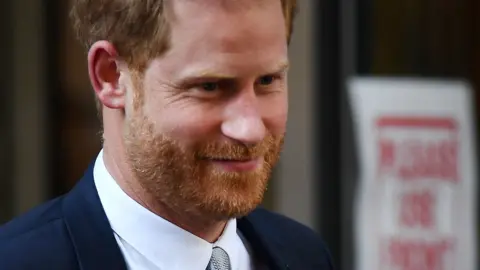Prince Harry security decision unfair, High Court told
 EPA
EPAPrince Harry has made a High Court challenge against the Home Office over his security protection when visiting the UK.
He wants to overturn a ruling that saw his security status downgraded after he stopped being a "working royal".
Prince Harry's lawyers, at the start of a three-day hearing in London, argued there has been unfairness in how the decision was made.
The Home Office said his security is decided on a case-by-case basis.
There will still be publicly-funded police security for Prince Harry, the Home Office lawyers told the court on Tuesday, but these will be "bespoke arrangements, specifically tailored to him", rather than the automatic security provided for full-time working royals.
Much of the legal proceedings, about security arrangements for senior figures, will be held in private.
The court hearing is considering the changes to publicly-funded protection that were made when Prince Harry stepped down from official royal duties and settled in the United States.
The committee that arranges security for members of the Royal Family and other VIPs - known as Ravec - decided in 2020 that Prince Harry would no longer have the automatic level of security for senior royals.
Instead the level of security would be arranged depending on the perceived risk, as it is with other high-profile visiting dignitaries.
But Prince Harry's lawyers on Tuesday argued there had been a lack of transparency about the decision and the prince had been not been treated the same way as others.
There is "no good reason for singling out the claimant [Prince Harry] this way," said his legal team.
Prince Harry's barrister, Shaheed Fatima KC, told the court: "Ravec should have considered the 'impact' a successful attack on the claimant would have, bearing in mind his status, background and profile within the royal family - which he was born into and which he will have for the rest of his life - and his ongoing charity work and service to the public."
But the Home Office's case argued that as the prince was no longer a working royal and lived overseas, "his position has materially changed".
"In those circumstances protective security would not be provided on the same basis as before," say lawyers for the Home Office.
An earlier hearing was told of claims from Prince Harry of "procedural unfairness" in how senior members of the Royal Household were part of the Ravec committee, along with police, counter-terrorism specialists and civil servants.
Among the royal aides on the committee was Sir Edward Young, private secretary to the late Queen Elizabeth.
Prince Harry's lawyers argued there were tensions between Sir Edward and the prince and as such the royal official should not have been part of the decision making.
The lower level of security has made it difficult to bring his family to the UK, the prince has argued.
But lawyers for the Home Office have repeatedly rejected challenges to the Ravec ruling, saying there was nothing in the claims that was likely to lead to a different outcome.
The hearing will continue until Thursday, with a ruling from the judge expected to be reserved to a later date.
Earlier this year Prince Harry lost a legal bid to be allowed to make private payments for police protection when he was visiting the UK, in a case that also focused on concerns about reduced security since ceasing to be a full-time working royal.
